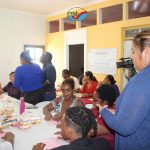UN Summit on Small Island Developing States (SIDS)

By Elizabeth Morgan
“SIDS are a special case for sustainable development. They require concerted long-term attention and investment of the entire international community.” UN SG
The United Nations General Assembly (UNGA) ended its week of summits at the start of its 74th Session with one dedicated to the specific sustainable development concerns of Small Island Developing States (SIDS). This was the High Level Mid-term Review of the SIDS Accelerated Modalities of Action (SAMOA) Pathway held on Friday, September 27. Jamaica’s Prime Minister Andrew Holness and other Caribbean Leaders were in New York for this summit which focused global attention on small island States.

The SAMOA Pathway, in its priorities, reflect the UN Sustainable Development Goals (UN SDGs). I am sure that most readers would not be familiar with SIDS and the SAMOA Pathway. This article aims to build public awareness of both.
The alliance of Small Island Developing States (SIDS), or AOSIS, was recognized at the 1992 UN Conference on Environment and Development held in Rio de Janeiro, Brazil. SIDS operate within the UN system, including in the UN Conference on Trade and Development (UNCTAD), with the aim of highlighting their vulnerability to external shocks, natural and man-made, and building resilience. The members of SIDS are mainly island nations and territories in the Caribbean and South China Seas, and the Atlantic, Pacific and Indian Oceans. The Member States of the Caribbean Community (CARICOM) are members of the SIDS alliance.
 The first International Conference on the Sustainable Development of SIDS was held in Barbados in April 1994 and resulted in the adoption of the Barbados Programme of Action for the Sustainable Development of SIDS. The second conference to review the implementation of the programme of action was held in Mauritius in January 2005 and adopted the Mauritius Strategy for the further implementation of the Barbados Programme of Action, and the Mauritius Declaration which recognized the importance of international trade in building resilience and sustainable development of island states.
The first International Conference on the Sustainable Development of SIDS was held in Barbados in April 1994 and resulted in the adoption of the Barbados Programme of Action for the Sustainable Development of SIDS. The second conference to review the implementation of the programme of action was held in Mauritius in January 2005 and adopted the Mauritius Strategy for the further implementation of the Barbados Programme of Action, and the Mauritius Declaration which recognized the importance of international trade in building resilience and sustainable development of island states.
 The third SIDS international conference was held in Apia, Samoa, in September 2014. The SAMOA Pathway was adopted at this conference. It set out an action plan for 10 years to 2024. The priorities to be addressed through partnerships include sustained and sustainable, inclusive and equitable economic growth with decent work for all; sustainable tourism, energy and transportation; food security and nutrition; water and sanitation; climate change and disaster risk reduction; and sustainable production and consumption. As stated, these are aligned with the UN SDGs. At the 71st UNGA in 2016, it was decided that a one-day summit would be convened in 2019 to review implementation of the SAMOA Pathway. In the lead up to the Summit, preparatory meetings were held at the regional and inter-regional levels. The Caribbean preparatory meeting and partnership dialogue was held in Belize in August 2018.
The third SIDS international conference was held in Apia, Samoa, in September 2014. The SAMOA Pathway was adopted at this conference. It set out an action plan for 10 years to 2024. The priorities to be addressed through partnerships include sustained and sustainable, inclusive and equitable economic growth with decent work for all; sustainable tourism, energy and transportation; food security and nutrition; water and sanitation; climate change and disaster risk reduction; and sustainable production and consumption. As stated, these are aligned with the UN SDGs. At the 71st UNGA in 2016, it was decided that a one-day summit would be convened in 2019 to review implementation of the SAMOA Pathway. In the lead up to the Summit, preparatory meetings were held at the regional and inter-regional levels. The Caribbean preparatory meeting and partnership dialogue was held in Belize in August 2018.
The Summit
The Summit assessed implementation of the Pathway in two roundtables under the themes, (1) Progress, Gaps and Challenges and (2) Priorities, Solutions and the Way Forward. Prime Ministers Gaston Browne of Antigua and Barbuda and Andrew Holness of Jamaica participated in these. Barbados Prime Minister, Mia Mottley, spoke on behalf of AOSIS and St. Lucia’s Prime Minister, Allen Chastanet, spoke for CARICOM in plenary. In addition, all CARICOM Leaders speaking in the UNGA General Debate on Friday took the opportunity to emphasize their SIDS concerns.

The Summit concluded adopting its political declaration calling for action to assist SIDS over the next 5 years to implement the SAMOA Pathway and thus the UN SDGs. It recognized the need for increased financing through investments, sustainable development finance, and international trade.
Again, CARICOM, at the national and regional levels, should further encourage involvement of the public and private sectors and civil society in the implementation of the SAMOA Pathway, the UN SDGs, climate change actions, and development financing through institution strengthening, policy mainstreaming and more effective coordination.
Submitted by Elizabeth Morgan, Specialist in International Trade Policy and International Politics
Source: CARICOM TODAY

 Previous Post
Previous Post Next Post
Next Post